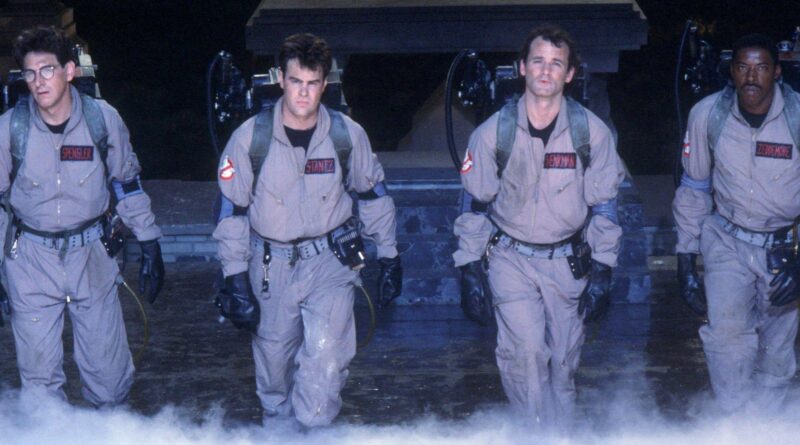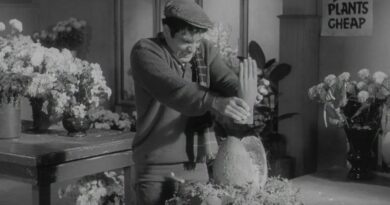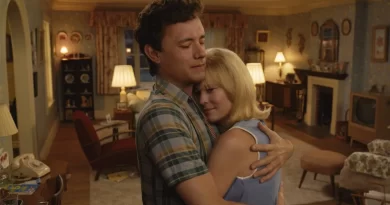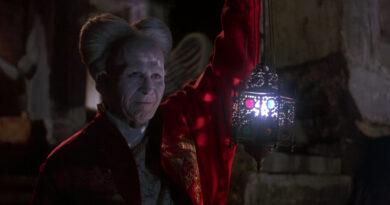Ghostbusters (1984)
Between Meatballs, Stripes, and his producing credit on National Lampoon’s Animal House, it’s safe to say that comedy is a genre Ivan Reitman is familiar with. With his latest film, Ghostbusters, that familiarity remains, and has not yet bred contempt. On the contrary; he has made a film with several laugh-out-loud moments, made possible by the natural comedic chemistry between frequent Reitman collaborators Bill Murray, Harold Ramis, and Dan Aykroyd. They get tremendous help from Sigourney Weaver, whose funny side has thus far remained unseen by moviegoers, and Rick Moranis, whose getup as a shy, cowardly, nerdy accountant with thick glasses was so effortless as to almost seem like cheating.
What Reitman hasn’t been so familiar with is special effects. Ghostbusters is an effects-lover’s wet dream, and as the title makes clear, just about all of them involve the supernatural. A great deal of work obviously went into them, and they were an absolute pleasure to look at. Hands down, this is the most ambitious film Reitman has yet made. But effects alone aren’t what impressed me the most; I was utterly amazed that the effects and the comedy were so seamlessly woven together. One doesn’t dominate the other. Superman gave me an inkling that such a thing was possible, although I would often forget that that film was based on a comic book, a medium that by definition is intended to be fun. It took Ghostbusters, an original screenplay, to prove the concept valid.
Murray, Aykroyd, and Ramis play New York City college professors who not only believe in ghosts, but actively design high-tech gizmos that can detect, catch, and incarcerate them. They channel this enthusiasm into the creation of a supernatural extermination company. Naturally, business is initially slow – nay, nonexistent. But then large numbers of ghosts start materializing all over the city, and business booms. Why the sudden supernatural surge? It has something to do with a Central Park West apartment building, where ominous paranormal happenings catch the attention of a cellist (Weaver). Being the Ghostbusters’ first client makes her, with initial resistance, the immediate object of Murray’s goofy affection.
Demonic possession and bodily transformations find their way into the story, as does the vindictive wrath of an EPA inspector (William Atherton), who has a personal vendetta against the Ghostbusters, especially Murray’s character. And then there’s the hiring of a fourth Ghostbuster (Ernie Hudson) about halfway through. All leads to a supernatural showdown atop the cellist’s apartment building, which includes a Godzilla-like encounter with a gigantic lumbering marshmallow man dressed like a cartoon sailor. Think the illegitimate love child of the Michelin Man and the Pillsbury Dough Boy, and you’ve got it. Exactly how did something so ridiculous end up as a monster in a ghost movie? The details aren’t important. Remember, we’re watching a comedy, and obviously, the purpose of a comedy is to make us laugh.
There are several things you must suspend disbelief for – and, for the skeptical, that means besides the existence of ghosts, most of which look like grotesque, cartoonish monsters instead of transparent people or floating sheets. For one thing, the Ghostbusters’ method of capturing ghosts, which involves shooting powerful electric laser beams out of handheld wands attached to very mechanical backpacks, causes tremendous structural damage; between fires, explosions, wall holes, smashed furniture, and broken glass, their clients would probably be better off just living with the paranormal activity. Even if clients are willing to overlook all the damage, they likely wouldn’t be able to afford their services; after ridding a haunted hotel of a gluttonous green ghost blob, they charge the uptight manager no less than $5,000.
As long as I’m being critical, I didn’t appreciate how late in the story Hudson’s character is introduced, or what little he’s given to do. He either should have been there right from the start, or not included at all. And then there’s the soundtrack, in which a series of pop songs compete with Elmer Bernstein‘s score (not at all unlike another Ivan Reitman production, the R-rated animated anthology Heavy Metal); the songs aren’t bad in and of themselves, but with the exception of a very catchy title song, they contribute nothing to the movie apart from pandering to the MTV generation. I would have preferred more of Bernstein’s music, which effectively straddles the line between jaunty humor and ghostly terror. But these are minor complaints. Though not perfect, Ghostbusters is a fun popcorn flick, perfect for the summertime.




